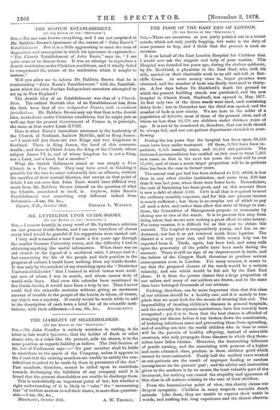THE SCOTCH ESTABLISHMENT.
[TO TIM EDITOR OF THE SPECTATOR."]
SIR,—No one man knows everything, and I am not surprised at Mr. Baldwin Brown's ignorance of the nature of "John Knox's" Establishment. But it is a little aggravating to meet the tone of dogmatism and assumption in which his ignorance is expressed,— " The Church Establishment of John Knox," says he, "I am quite content to dissent from. It was an attempt to reproduce a Jewish institution under Christian conditions, and it wholly failed to comprehend the nature of the institution which it sought to restore."
Will you allow me to inform Mr. Baldwin Brown that he is confounding "John Knox's Establishment" with the Establish- ment which his own Puritan Independent ancestors attempted to set up in New England ?
The Jewish idea of an Establishment was that of a Church- State. The radical Scottish idea of an Establishment has, from the first, been that of two independent Powers, with co-ordinate jurisdictions. Mr. Baldwin Brown may say that that is the Jewish idea, worked out under Christian conditions, but he might just as well say that the present Government of France is, in principle, the same as that under Louis XVIII.
Here is what Knox's immediate successor in the leadership of the Church of Scotland, Andrew Melville, said to King James : —" I must tell you there are two Kings and two kingdoms in Scotland. There is King James, the head of this common- wealth ; and there is Christ Jesus, the King of the Church, whose subject James VI. is, and of whose kingdom he is not a King, nor a Lord, nor a head, but a member."
What the Scotch Reformers aimed at was simply a Free Church in a Free State. They may have erred in thinking it possible for the two to enter voluntarily into an alliance, without the sacrifice of their mutual liberties, but except on that point of detail, I am not sure that John Knox would have differed very much from Mr. Baldwin Brown himself on the question of what the Church, considered in itself, is. Anyhow, John Knox's Establishment was something very different indeed from Solomon's.—I am, Sir, 8:c.,


































 Previous page
Previous page